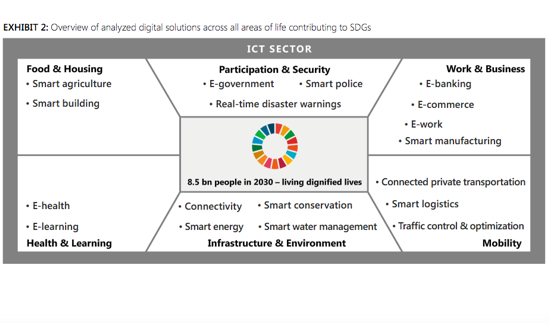 |
| Reviews and Templates for Expression We |
The $2.1 Trillion Revenue Opportunity for ICT Companies

Information and communication technologies (ICT) companies could realize $2.1 trillion in new annual revenue by 2030 from services that promote the UN’s 17 Sustainable Development Goals, according to a report by the Global e-Sustainability Initiative (GeSI) and Accenture Strategy.
The report, #SystemTransformation: How digital solutions will drive progress towards the sustainable development goals, says digital technologies can shape a more sustainable future. It also highlights the opportunity for companies in the ICT sector to drive growth and competitiveness by investing in these 17 initiatives that aim to tackle climate change, provide clean water and end poverty, among other ambitious targets, by 2030.
The $2.1 trillion in additional revenue includes $400 billion per year from connecting an additional 2.5 billion people to communication services by 2030. Additionally, $1.7 trillion can be realized from digital technology contributing towards SDG achievement, including eCommerce ($580 billion), eWork ($537 billion), smart buildings ($200 billion), eGovernment ($86 billion), and online learning ($75 billion).
For example, digital technologies can help agribusiness companies increase yields (SDG #2 — no hunger) while using less water and applying less and more precise pesticides (SDG #6 — clean water), Accenture’s Justin Keeble said in an interview. Smart building technologies and energy management systems can help curb carbon emissions and drive renewable energy (SDG #13 — climate action). And the Internet of Things and robotics can help bring almost $1 trillion in economic benefits to industries from smart manufacturing and smart logistics (SDG #9 — innovation and infrastructure).
“We want companies to understand there is commercial opportunity across the 18 SDGs,” Keeble said. “While companies can harness digital technologies to achieve cost savings in their own business and across the supply chain, there are also the broader, intangible benefits such as brand enhancement that companies create when they align their core business with the SDGs.” Keeble says these intangible benefits can add further revenue opportunities as well.
The GeSI study echoes a larger look at CEOs views on the SDGs: three-quarters of CEOs (75 percent) report that digital technologies enable more sustainable business models such as the circular economy, according to a study by the UN Global Compact and Accenture.
The United Nations Global Compact-Accenture Strategy CEO Study 2016 surveyed more than 1,000 CEOs that participate in the UN Global Compact and found 49 percent say businesses will be the most important actor in achieving the SDGs. Granted, these CEOs are members of the UN Global Compact — the world’s largest corporate sustainability initiative — which means they are already committed to sustainability. This may explain why another recent study suggests engaging in the SDGs isn’t a top priority for many executives.
The Ethical Corporation’s State of Responsible Business 2016 report found just under half (42 percent) of corporate responsibility executives and experts will be looking to engage in the SDGs. In the US, that number drops even lower: only 37 percent of corporate respondents said they were planning to engage with them.
So why should executives care?
In a blog on The Guardian, Bhaskar Chakravorti, senior associate dean of international business and finance at The Fletcher School, Tufts University, writes that the SDGs cannot succeed without business leadership. He also points to estimates from McKinsey, which forecast a $30 trillion consumer market in 2025 in emerging markets, and says investing in sustainable development can help mitigate business risk from disrupted operations, supplies or reputational damage.
As Chakravorti writes: “Each CEO should imagine the world of 2030 with and without progress on the goals and what the differences would be for their respective companies.”
Image Credit: #SystemTransformation: How digital solutions will drive progress towards the sustainable development goals
|
|
|
|
Copyright remains with the original authors |